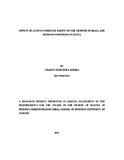| dc.description.abstract | The main purpose of the study was to establish the effect of access to private equity on the growth
of small and medium enterprises in Kenya. The study was guided by the following specific
objectives: to establish the current status of private equity investment in the SME’s sector and to
determine the effect of private equity on the financial performance of SME’s institutions. The
study adopted a descriptive survey research design. The population in this study was all top 100
SMEs registered in Nairobi, acquired from the Nairobi County government records. 30% of the
accessible population is enough for the sample size. Therefore, for the sake of this study 30 SMEs
was studied. Semi-structured questionnaires were used to collect data at the premises of the
participant SME’s using an administered questionnaire. The completed questionnaires were
reviewed and edited for accuracy, consistency and completeness. The data was analyzed using
descriptive statistics, such as mean scores, percentages and standard deviations. The results were
presented in frequency tables, charts and graphs. Regression and correlation analysis was applied
to show the relationship between variables. Various tables, charts and bar graphs and diagrams
were used to present the data for easy interpretation. The study findings established that SMEs
need all market participants to ensure the continued growth of microfinance and thus the
continued impact on poverty alleviation in developing countries; lack of access to credit is a major
constraint inhibiting the growth of SME’s sector; external borrowing of SMEs is considered to be
the cheapest source of financing because of the tax benefits; the collateral requirement affects
requirement of private equity on SMEs growth to a great extent and SME’s growth indicators
identified in the study findings established an improvement in business efficiency, business costs,
increase in sales volume, number of new customer and improvement on new customer
satisfaction. The study recommends that SME’s should invest in the right model especially in the
private equity space; SME’s should have an appropriate capital structure that generates the
maximum profit; Microfinance should serve as a substitute and improve the living standard of the
inhabitants and profitable SME’s, which have lot of tangible asset, should be offered as collateral
for debt, may have a higher target debt ratio. | en_US |

